- Episodes : 13
- Genre : Comedy, Seinen, Slice of Life
- Airing Date : October 2014 – December 2014
- Producers : Seven, Dream Creation, DAX Production
Danna ga Nani wo Itteiru ka Wakaranai Ken Preview / Plot (No Spoilers)
"I wonder how my husband and I were able to get married – maybe because we know our faults?"
Ever wondered what being married to an otaku might be like? Or, have you ever wondered whether or not it would be possible to spend your life with someone that has a completely different personality, and a completely different set of interests?
I Can’t Understand What My Husband Is Saying, which is based on the manga of the same name, tells the unlikely story of the married life of two totally opposite characters: an office lady, Kaoru, and her titular otaku husband Hajime. Through a series of short episodes we get a glimpse of their daily life, their circle of friends and, naturally, how they ended up as a couple.

Who does Danna ga Nani wo Itteiru ka Wakaranai Ken (I Can’t Understand What My Husband Is Saying) cater to?
The premise of I Can’t Understand What My Husband Is Saying is very simple – we observe Kaoru and Hajime’s daily activities, such as hanging out with friends, eating dinner, drinking beer and celebrating christmas. In addition to being a fly on the wall, we’re also served their and their friends’ backstory through a series of flashbacks. As you might have guessed, the main theme of the show is the relationship between the two main characters. You might think that being an otaku is a prerequisite for watching this show, but, as it is seen mainly from Kaorus point of view, it doesn’t require you to have a deep understanding of otaku culture to enjoy it. In fact, it could be regarded as a crash course in anime nerdiness – you’ll see plenty of ecchi, yaoi, schoolgirls, figurines and other things related to this fascinating aspect of Japanese culture.
Visually, I Can’t Understand What My Husband Is Saying draws on its source material, meaning that it often features hand-written frames and other effects that look like it comes straight out of a manga strip, thus making the series’ aesthetics enjoyable for avid manga readers or anyone who appreciates this kind of style.
Danna ga Nani wo Itteiru ka Wakaranai Ken caters to busy people – for example, if you’re teaching English for some "black", sketchy Japanese corporation, this one won’t steal more than 3-4 minutes of your precious time. It is totally possible to watch the entire first season in less than forty minutes, making it a very accessible anime.
What's so appealing about this piece of work.
If you’re an otaku, chances are that you’ve already watched this anime, and you probably enjoyed it a lot as well (scroll down for the review). The genius of this show, however, is that it doesn’t only appeal to those that are already hardcore anime fans – it takes a theme that is pretty narrow to begin with and makes it about something more general, something that anyone can relate to – cross-cultural communication and understanding.
As mentioned above, one of the things that make this show accessible is the length: starting watching this show doesn’t feel like the kind of commitment that shows like, say, One Piece is – the format is definitely one of the most appealing things about this anime.
Others have mentioned how this anime utilizes an old form of Japanese comedy called Manzai, a style that is fairly similar to the "double act" humour known from for example the US. The comedy often stems from the contrast between Hajime’s expressionless face and Kaoru’s emotional outbursts, and the fact that the comedic elements of the show are executed well is an important reason for why you should check out I Can’t Understand What My Husband Is Saying – if you like cute, charming romantic comedy, this show will make you laugh.
There is something something more, however, as we also get to experience a lot of tender, and even sad moments that arises from the different issues Kaoru and Hajime has to cope with – it basically has all the ups and downs anyone would have in their life.
Cute, but also serious, short but also compact – it exploits those short minutes brilliantly. It feels realistic, and the characters are believable – isn’t that exactly the definition of what makes any show great?
Danna ga Nani wo Itteiru ka Wakaranai Ken Episode 1
Danna ga Nani wo Itteiru ka Wakaranai Ken Main Characters List
Tsunashi Kaoru

Voice Actor :Tamura Yukari
Pretty much your average OL (office lady, a Japanese term for a working woman), Kaoru is an earnest girl that works hard, enjoys her occasional beer and karaoke, and probably almost hasn’t ever read a single strip of manga. She is the main character of I Can’t Understand What My Husband Is Saying (hence the title), and the story is mainly told from her point of view. We feel sympathy for her in her titular struggle to understand what her husband is saying, and are also touched by her brave attempts at making their relationship work.
Tsunashi Hajime
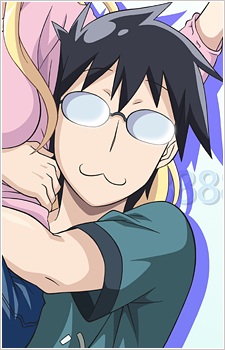
Voice Actor :Suzumura Kenichi
The dead-pan, socially awkward Hajime is a stark contrast to his "normal" wife. He doesn’t understand why it’s inappropriate to cockblock his friend and his girlfriend’s on christmas eve (which, in Japan, is a holiday that is usually spent together with your partner), or why it’s wrong to want to wear his future daughter’s panties. His heart is in the right place, though, and that’s probably why he belongs to the minority of otakus that actually manage to get an IRL girlfriend.
Contains Spoilers
Danna ga Nani wo Itteiru ka Wakaranai Ken Review
Don’t lie, you enjoyed this show. I have to admit that I don’t usually watch romantic or comedy anime, so my expectations weren’t high when I started watching the first episode. But then I was surprised as I completely fell in love with it – because, really, what’s there not to like? It is sweet, charming, colorful, funny but also realistic and serious from time to time, with a near flawless execution.
One could’ve thought that a show about an otaku and his wife would turn out cheesy and totally uninteresting for anyone but the hardcore anime fans. Instead, what we get is a realistic portrait of married life, an interesting look into contemporary Japanese culture and, maybe most importantly, a statement about communication across cultures. What seems like a simple and straightforward plot actually manages to discuss complex themes like prejudice and cross-cultural understanding.
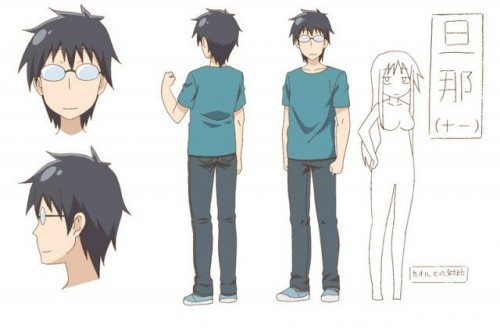
The story is believable, and luckily it doesn’t have to many of those dreadful anime cliches – even though they belong to and represent certain groups, the characters actually act like individuals, unlike the majority of anime that’s been coming out lately. We can definitely relate to Kaoru and Hajime, and we can watch them evolve over the span of the first season, as well get a better understanding of their backgrounds through the non-linear slice-of-life-ish flashbacks. The supporting cast is gradually introduced, and includes some hilarious characters, like the cool Miki or Hajime’s brother and Yaoi celebrity Mayotama.
Although I’ve never been married, so I’m technically not qualified to say anything about this, I imagine this show gives a good look into what married life will be like, with the aforementioned ups and downs. It is a quirky series that avoids getting too cheesy, making it funny and light-hearted while also preserving some emotional depth – this balance makes it cute without being KAWAII!! cute, something which is a scarce good in recent anime.
As I’ve already mentioned above, the format of I Can’t Understand What My Husband Is Saying works excellent: it can be watched in one sitting on a Wednesday evening, or episode by episode during a brief brake at work. This isn’t just about the duration, though: In any form of art briefness is one of the most difficult things to do right – the show definitely deserves some credit for pulling this off.
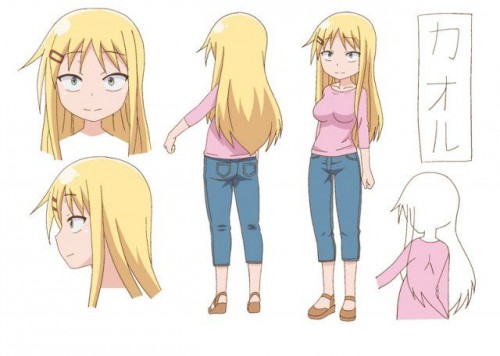
One could object that the pace sometimes make it hard to keep up with the dialogue – especially if your Japanese is not fluent enough to understand what the characters are saying. You really do get tired of reading those subtitles flashing by at lightning speed, but you’ll probably get used to it after watching the first couple of episodes. It should also be mentioned that a lot of the humor probably doesn’t translate that well into English, and this makes the viewing experience less delightful for a non-Japanese speaker. But come on, isn’t that true for any anime out there anyway?
And, even if you’re a hardcore otaku, you probably don’t get all the references in this anime. The author does certainly not belong to this category, and had to do some background research on a lot of the things mentioned – I tried to take a study-like approach and treat it as an introductory class to otaku culture.
Anyhow, some minor flaws aside, I Can’t Understand What My Husband Is Saying turned out to be one of the best anime experiences in 2014, showcasing all the characteristics that makes this form of art (or entertainment, if you like) great.
1. Anime/Otaku references
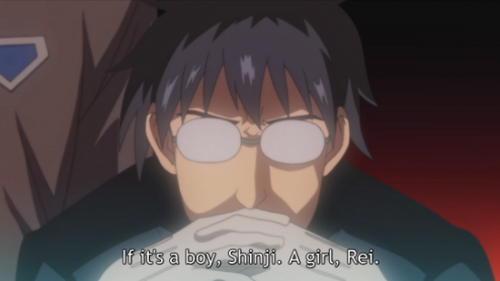
No matter if you understand them or not, all the references to anime, manga and otaku culture in general will definitely make you laugh – for example when, during a talk about having children, resolutely folds his hands like a certain father from a certain sci-fi anime: "if it’s a boy, Shinji, a girl, Rei".
2. Miki and Mayotama’s ambiguous relationship
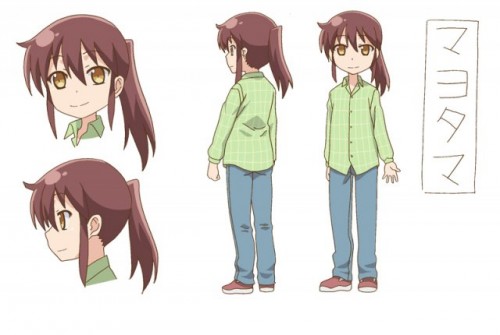
The cool Miki is initially infatuated with Hajime’s slightly perverted younger sibling – until he discovers that he’s a boy, The Crying Game-style. Their ambiguous relationship continues, however, and I guess we’re hoping for a ending similar to that movie.
3. The closing theme
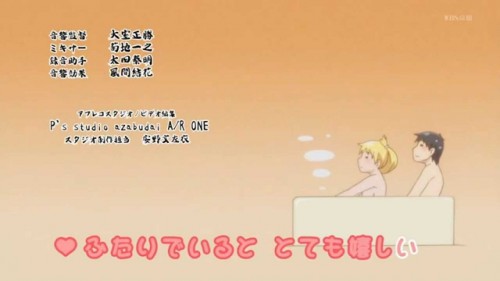
After each episode, we get to see one of the most charming end credits I’ve seen so far: We can’t help but feel envy when we see Karou and Hajime sitting in the bathtub, rocking back and forth, singing one of the cutest duet you’ll ever hear.
If you, or any of your friends, happen to be hopeless otakus, or if you’re having a hard time communicating with your partner, you learn something important from watching I Can’t Understand What My Husband Is Saying – if you just try hard enough, and if you find someone you really like, it’ll work out in the end. It sound’s like a cliche, but, as with most cliches, it might just turn out to be true.
Recommended Post



